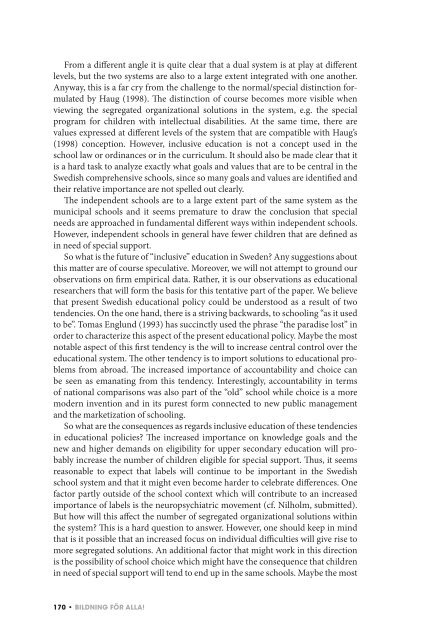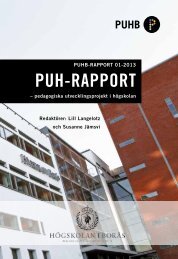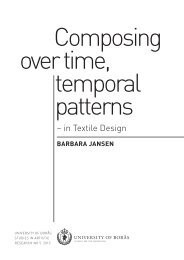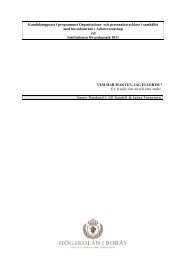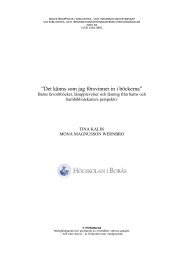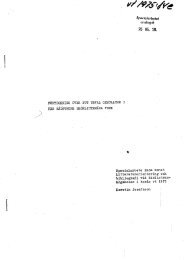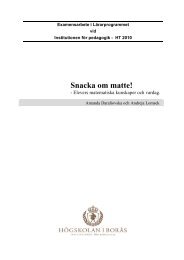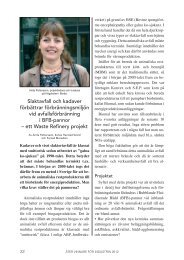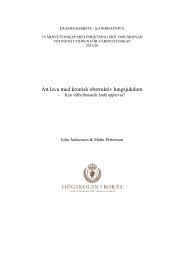Bildning för alla! - DiVA
Bildning för alla! - DiVA
Bildning för alla! - DiVA
You also want an ePaper? Increase the reach of your titles
YUMPU automatically turns print PDFs into web optimized ePapers that Google loves.
From a different angle it is quite clear that a dual system is at play at different<br />
levels, but the two systems are also to a large extent integrated with one another.<br />
Anyway, this is a far cry from the challenge to the normal/special distinction formulated<br />
by Haug (1998). The distinction of course becomes more visible when<br />
viewing the segregated organizational solutions in the system, e.g. the special<br />
program for children with intellectual disabilities. At the same time, there are<br />
values expressed at different levels of the system that are compatible with Haug’s<br />
(1998) conception. However, inclusive education is not a concept used in the<br />
school law or ordinances or in the curriculum. It should also be made clear that it<br />
is a hard task to analyze exactly what goals and values that are to be central in the<br />
Swedish comprehensive schools, since so many goals and values are identified and<br />
their relative importance are not spelled out clearly.<br />
The independent schools are to a large extent part of the same system as the<br />
municipal schools and it seems premature to draw the conclusion that special<br />
needs are approached in fundamental different ways within independent schools.<br />
However, independent schools in general have fewer children that are defined as<br />
in need of special support.<br />
So what is the future of “inclusive” education in Sweden? Any suggestions about<br />
this matter are of course speculative. Moreover, we will not attempt to ground our<br />
observations on firm empirical data. Rather, it is our observations as educational<br />
researchers that will form the basis for this tentative part of the paper. We believe<br />
that present Swedish educational policy could be understood as a result of two<br />
tendencies. On the one hand, there is a striving backwards, to schooling “as it used<br />
to be”. Tomas Englund (1993) has succinctly used the phrase “the paradise lost” in<br />
order to characterize this aspect of the present educational policy. Maybe the most<br />
notable aspect of this first tendency is the will to increase central control over the<br />
educational system. The other tendency is to import solutions to educational problems<br />
from abroad. The increased importance of accountability and choice can<br />
be seen as emanating from this tendency. Interestingly, accountability in terms<br />
of national comparisons was also part of the “old” school while choice is a more<br />
modern invention and in its purest form connected to new public management<br />
and the marketization of schooling.<br />
So what are the consequences as regards inclusive education of these tendencies<br />
in educational policies? The increased importance on knowledge goals and the<br />
new and higher demands on eligibility for upper secondary education will probably<br />
increase the number of children eligible for special support. Thus, it seems<br />
reasonable to expect that labels will continue to be important in the Swedish<br />
school system and that it might even become harder to celebrate differences. One<br />
factor partly outside of the school context which will contribute to an increased<br />
importance of labels is the neuropsychiatric movement (cf. Nilholm, submitted).<br />
But how will this affect the number of segregated organizational solutions within<br />
the system? This is a hard question to answer. However, one should keep in mind<br />
that is it possible that an increased focus on individual difficulties will give rise to<br />
more segregated solutions. An additional factor that might work in this direction<br />
is the possibility of school choice which might have the consequence that children<br />
in need of special support will tend to end up in the same schools. Maybe the most<br />
170 • BilDning fÖr AllA!


